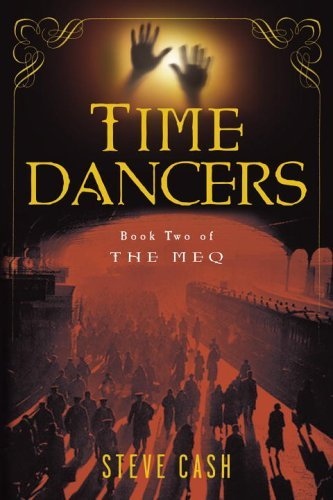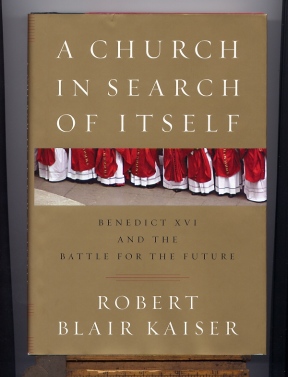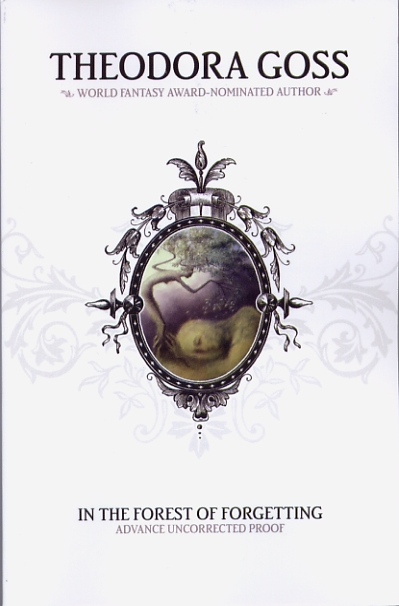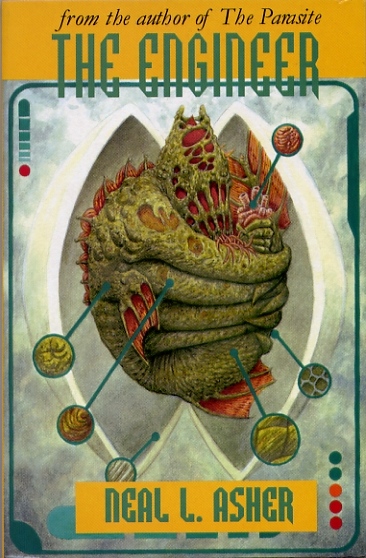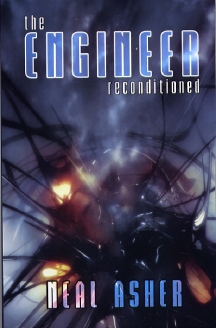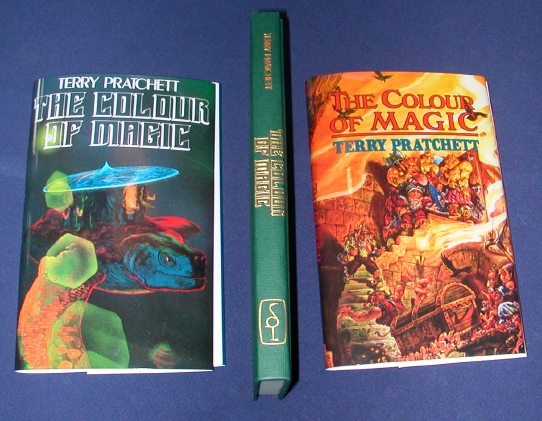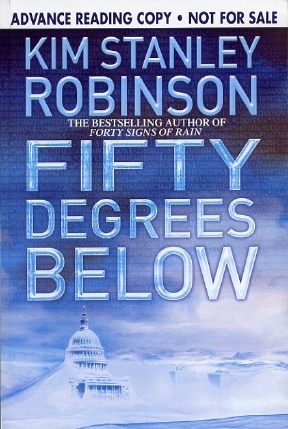|
|
|
This Just In...News from the Agony Column
|
03-17-06: Join Steve Cash and the 'Time Dancers' |
|||
Book
Two of the Meq
But, as I later found out, Cash's agent knew folks in the UK, and thus 'The Meq' ended up at the ever-in-the-forefront Pan Macmillan two years before it made a stateside appearance from Ballantine / Dely Rey. Last year, they published 'The Meq', and at that time I wondered if we'd be waiting another three or so years before the next installment would arrive. That's clearly not the case, because the Meq have once again returned. For readers who enjoyed the first novel; for those who haven’t yet read it, Cash's tale of a race that hides within the human race may seem ever more insightful, now that the New Weird has made these sorts of oddball fantasy inventions more acceptable to genre-fiction reading public. Or at least that microscopic portion of genre-fiction readers who have dipped into the New Weird. That said, what we have here is the middle book of a trilogy, something that ends with a TBC. Or at least a message that this is "THE END OF BOOK TWO". As a middle book in the trilogy, it occupies a perilous literary place. You can't read it without having read the first novel, and it starts a story that by definition it cannot completely finish. It has the job of upping the ante by never calling the bet. As the novel begins, The Meq are gathering. They're a nearly immortal race that looks a lot like humans -- young humans -- but they're not humans. They live among us and through us. But not all of them are happy about it. There's always a, in this case, Fleur-du-Mal, ie: bad apple. Someone who wants to and actually can spoil the whole barrel. Cash offers readers a very interesting proposition here, taking some of the tropes of the vampire but leaving behind the (to me) boring culinary habits and all the matinee-movie affectations and keeping the more interesting aspects of the mythos; that's the "they live among us" shtick. Until recently, this kind of fiction would have been a much harder sell. Cash's saga doesn't have the automatic blood-and-sex appeal of vampire sagas, but his fantasy element is strong enough to keep the books out of the hands off the shelves of historical fiction. Yet his historical aspects play a major role here, and to my mind, the toning-down of the S&V is a big plus. For those of us immersed in the genre, Cash lacks all of the usual qualifications for fantasy writer. He hasn’t published a bazillion stories on the websites, or in the standard-issue magazines. He didn't, so far as I know, attend Clarion. For many readers (myself included), the whole Ozark Mountain Daredevils gig might be taken as something of a disqualification. But that's why I'm inclined to give Cash and his fish-out-of-water series some serious attention. It is true that often writers who have never worked in the genre think that it's just so easy to write science fiction, fantasy, whatever -- often they can't be bothered to even consider the distinctions. I don’t think that's the case here. Steve Cash has a singular vision and he writes some nicely textured prose. What makes these books so appealing is that Cash seems to be very much off in a world of both his own and our own. Genre fiction is something of a clique; Cash is a clique-buster. As a reader browsing the shelves, reading about books as well as reading them, we do well to look off the beaten path, outside the blinders. We love our little clique, but mostly we love it because we'll let anyone in -- even ourselves. |
|
03-16-06: Robert Blair Kaiser Finds 'A Church in Search of Itself' |
|||
'Benedict
XVI and the Battle for the Future'
How that statement made any sense at any time escapes me. Oh well, better late than never. I do have an abiding interest in the doings of the Catholic Church, based solely on my horror-fiction and Fortean fiction interests. From exorcisms to apparitions of the Blessed Virgin Mary, The Catholic Church is simply a fountain of story ideas and fascinating writing. For example, there's Randall Sullivan's 'The Miracle Detective', a non-fiction look at how the Church vets so-called miracles. It's a powerful and entertaining book. Perhaps it was the cover and the old colonic title style that put me off. My wife and I often joke about how the book review section of a local newspaper seems to be the "High Colonic of Criticism," because every week, it's filled with reviews of oh-so-serious books with colons in their titles. It's a totally unfair accusation because a) publishers love non-fiction, it sells better, I suppose, and thus there's a lot of it about to review and b) every other book review section has pretty much the same problem. Or it could be the gold brocade cover that made the book on the invisible side. You know the invisibility suits that they get in 'A Scanner Darkly', the Philip K. Dick novel currently about to be released as a movie? (Oh my...another PKD movie. Breathless, I'm breathless.) Well some dust jackets work the same way those suits work, that is, you look at them but you don’t notice them. (At least that's how I recall them working in the book. Who knows what they’ve done in the film? Who cares? It might kill a couple of hours effectively.) This is one of those DJs. Well, no matter. This morning, when I was going to write about another book that did catch eye, I decided to let this book into my brain. Bad move, at least, for those of us who wanted to read about that other book. You'll have to wait! 'A Church in Search of Itself' proves to be a pretty exciting contemporary thriller. What are you on (about) Rick, you say? Well look, it should be patently obvious. Even as I type they are whinging and cringing in the UK, where the authors of 'Holy Blood, Holy Grail', another non-fiction work about the Church (well -- at least it was published as non-fiction, but then so was 'A Million Little Pieces' and we all know how that worked out) are suing the author of that book for ripping off their non-fiction and converting it to fiction. (At least, that's where that book is shelved, because the bookstores obstinately refuse to create a separate place for "potboilers".) The author of that book is on the stand, defending his right to hang a bad thriller onto the premise of 'Holy Blood, Holy Grail'. And HBHG doesn't necessarily lend itself to a thriller like this one does. In 'A Church in Search of Itself', butt-kicking, karate-chopping, ex-Jesuit warrior priest Robert Blair Kaiser blows the lid off the recent (s)election of Cardinal Joseph Ratzinger as Pope. Maybe that's giving this the wrong spin. But you can bet those words slipped out of somebody's mouth, somewhere, as they searched for the Holy Grail of publishing, which is, alarmingly, that book. Me, I look at 'A Church in Search of Itself' as a gripping piece of journalism by a veteran news reporter who's covered the Vatican only slightly less thoroughly than the red brocade capes these superheroes of the Church wear. The set up here is admirably simple. He talks about the politics of the church, sets up the process for selection and discusses the legacy of John Paul II. Kaiser's no fan of the current direction of the Church, and the efforts to combat change from within the Church. He then gives thorough biographies of six of the Cardinals who did the voting. Fascinating stuff, and a wonderful portrait of our world as well as the Church. Then he goes where no man has gone before (and no woman either, of course); inside the process of election itself. To my mind this is the recipe for a tense legal thriller, indeed, it’s sort of 'Twelve Angry Men In Red', no? I dare you to disagree, knowing that the wrath of my Inquisitioners shall descend upon you! And should you care to fictionalize this work? Look, did I mention that Kaiser is a Jesuit? They say he left, but you know, you never leave the Jesuits. He's got a crack squadron of elite albinos, wearing the dust jacket of this book to keep them from being seen, to keep them, yes invisible! You'd better think twice, no three times, no just forget about fictionalizing this story. What's that sound behind me? Oh, nothing, just the teapot whistling. Of course, the main reason you'd best forget about fictionalizing this book is because well, it's pretty damn exciting once you manage to actually see it. The Catholic Church is, not to put too fine a point on it, huge. It is important beyond government, beyond the past and certainly beyond the future. You do care what happens, and Kaiser tells you what happens. What more do you need to know? It has plenty of photos, scary photos. Who are the good guys? Who are the bad guys? Kaiser is an informed and interesting writer with lots of ideas as to who is who, and what could happen. As far as booksellers go, the fact that it has the word "Future" in even the post-colonic title segment might cause them to consign it to the science fiction section of the bookstore. So, should you discover it there, don't believe that it's a conspiracy. They're not trying to hide this book, they're trying to sell this book, colon and all. What is that noise? It sounds like someone's walking around wearing a suit of dust jackets. Oh, I see, it's nothing, just a |
|
03-15-06: Theodora Goss Is To Be Found 'In the Forest of Forgetting' |
|||
There,
She Will Mesmerize You
I. Hypnosis is some kind of myth. It is a self-induced state created by those willing to delude, for those willing to be deluded. II. You are the willing. Well, I am at least. Reading is deceptively simple. You look at the words, and "read" them. No big deal, right? Yes, it is a big deal. Reading isn’t something that can simply be imposed up on you. Nobody can take you, prop you up, wire open your eyes, Clockwork Orange-style, and project words on the screen in such a manner that they must enter your brain in the same fashion as a movie. No, you must be willing to read. For all the apparent stillness, reading is an activity that you engage in by virtue of first, having learned to read, and second, having learned the desire to read, to engage your mind in the activity of translating the words, that activity we so simply and blithely label as "reading". III. Now you have chosen to read, and in this case, you're reading phosphor, ephemeral glowing dots, dancing electrons. Particles, waves, ask the physicists. The point is that you're making the effort, you're contributing to the process, if you don’t like what you’re reading here, then be reminded that you're part of the problem. But let's cut to the chase. You're here because you want to find out about this new book, this new reading experience that awaits you between the covers of 'In the Forest of Forgetting' (Prime Books ; March / April 2006 ; $24.95) by Theodora Goss. My job, as I see it, is to give you an idea of what awaits you, to prepare you and help you decide whethers or not you should engage in this particular reading experience, in this particular mental activity. How am I doing? IV. The chase begins even before you open the book. It's a collection of stories, and you can tell by the demure but detailed cover that Prime has pulled a 180-degree turn from yesterday's reading presentation, a collection of hardcore, rough-edged stories by a science-fiction horror writer. If you can't tell, well – I've just told you, haven’t I? 'In the Forest of Forgetting' is by no means delicate, however, and it is often rough. Goss is a modern fabulist. She's not presenting the world, or a world. She's interpreting, into language, into a reading experience, distilling people, places, tales and lives. She does not translate, she transfigures. Go figure. Go! And if reading is critical to you, then know that words are critical to Goss. Even though there's nothing that you'll look at and think: "Hah! A Poem!" There's plenty of poetry here. Her language is consistently gorgeous, whether she's being lyrical or gritty, circuitous or straightforward. Even separated from the sum total of the journey that might be one analogue for the reading experience, her words seem pluperfect. There's an air of mathematical discovery here. V. Though she writes in short stories, Goss has a tendency to break even this form down into smaller portions. As much as you will admire her writing, you might not want her to feed you if you were to show up at her door on a windswept night, hungry and chilled. Or at least, so you’d think, until, like the food fed to sleeping travelers by fairies, you realized that a single bite, a single flake, a single word, a single moment might expand into a complex universe, a maze of choices, a forest of self-same trees. Every turn you take shows you something different, something the same, something beautiful but somehow, in that beauty, there is a deep terror. Mindwipe white. Blackout. Each story here has all the potential of a simple maze to be simply solved, or to offer hours of single-step, word-by-word joy. This presumes you're inclined to find joy in fables, in our world transformed by language into something is both surely is and is not. You find fear, you'll find love, you'll be lost in the surreal and you'll forget to remember any of it. The collection is called 'In the Forest of Forgetting'. They’re not lying. Language never lies until it enters your eyes and then that is the only thing it does. Get over it, get used to it, learn to love it. Maybe just learn. VI. There are so many details I could filter for you. Yes, the World Fantasy Award-Nominated story from Polyphony 4, 'The Wings of Meister Wilhelm' is here. Cover art by Virginia Lee, and interior design by Luis Rodgriues. No need for me to filter Ms. Goss. She does a fine job on her website. There's also a website for the book. I'm just here to translate and transfigure my reading experience into a reading experience for you. How am I doing? |
|
03-14-06: Neal Asher's 'The Engineer Reconditioned' |
||||||
Twenty
Bucks Indeed!
So, let me explain. It was almost five years ago to the day when I first wrote about 'The Engineer' for this column. Early days then, still figuring out what I wanted to do. And you know what? It's still early days and I'm still figuring out what I want to do. Funny that, and probably not surprising that I'm still avidly reading Asher. I know I imported my first copy of 'The Engineer', but I can't for the life of me remember from whom. But I liked it enough to buy it again when I saw it at The Other Change of Hobbit, crammed into some shelves upstairs with 'Mesmer' by Tim Lebbon. And I liked it enough to buy it again when I discovered Handee Books over in...Santa Clara? San Jose? Made a special trip over to those guys, and it was well worth the trouble; I found 'Rain', a Stephen Gallagher novel I'd been looking for ages in hardcover as well. I probably paid twenty bucks for that last used copy, and I was happy to do so. Asher had yet to really make a big name for himself, and it seemed to me that having spare copies of the small-press printing of one of his most important novellas was certainly a good idea. I knew at least one of my reading buddies would love it. And now, I find myself able to pick up the same stories in this delightful trade paperback, still wondering what the folks at Tor are thinking. Well, undoubtedly it’s the bottom line. But is it the "Too British" bottom line or the "short story collections don’t sell" bottom line? Whichever one it is, to my mind they missed out big-time. If you've read any Asher, you need to read 'The Engineer Reconditioned'.
But of course, no need to wait for more -- it’s here in abundance. You get 'Spatterjay', which I believe to be the earliest appearance of that planet in Asher's fiction. It shows up again in 'The Skinner' and his latest, 'The Voyage of the Sable Keech'. Both of these are wonderful novels. 'The Skinner' got an enthusiastic review in the New York Times, not a noted source of information about over-the-top SF monster novels. Again, you’d think that Tor would leap at the chance to publish this, and I don't know why they didn't and again, you can only thank Cosmos / Prime Books. Thanks, Sean! This is one-hundred percent Ace! Asher's energy in this book is like grain alcohol, intoxicating and dangerous. Then of course, you get three, count 'em three stories that weren't in the original collection. Yes, the page numbers in my TOC were screwed up. But the text was just fine, and you get 'The Torbeast's Prison' an offshoot of the novella that was the incept point for Asher's PKD-nominated 'Cowl'. Asher swears in the intro -- as he has to me -- that he'd never heard of either Tor publishing concern before he wrote the 'Cowl' stories. Well, the UK Tor sort of came into being to sell his stuff. I guess I can buy that he never heard of the US publisher. Unless he used the time machine at the core of these stories, and now it's all starting to make sense. You get two others; 'Tiger Tiger', which is set in the same universe as an earlier story in the collection, 'Owner' which is, according to Asher yet another Asher universe, also treated in 'Africa Zero'. Asher confesses in his intro to feeling trapped by his universes, which is, on the face of it, rather ridiculous. Yet in retrospect, you can see how it might be possible. The final new story in 'The Engineer Reconditioned' is 'The Gurnard', written for a defunct-before-the-story-was-finished magazine started by the visionary Anthony Barker behind Tanjen. While the whole story did appear in Kimota, it's nice to have it here. It features an appearance from Erlin Tazer Three Indomial, who co-anchors 'The Skinner' and 'The Voyage of the Sable Keech'. There are any number of reasons to buy 'The Engineer Reconditioned'. If you've not yet read Asher, and think that you want to test the waters, this is a great way to do so. If you already own the original copy, you can get this one simply for Asher's intros and the three new stories. And again, if you own the original, you can get this one in hardcover because, well, you must have hardcover copies where available. Oh the life of the compulsive book reader and buyer. So full of fun, of monsters and opportunities to spend like there is no tomorrow. And so full of fiction which makes you hope that there's no tomorrow. Unless you're a parasitophilic type, in which case, it's a great big beautiful tomorrow, filled with blood-sucking leeches and air-filtering external lungs that attach to your chest and drill holes through your pulsing flesh. And yes, it will be warmer; no need to keep the coat. |
|
03-13-06: Terry Pratchett's Discworld X12 from Hill House; Kim Stanley Robinson Interview Part 2 |
|||
|
Affordable Luxuries It's been over a year since I first wrote about the Hill House editions of the Discworld books by Terry Pratchett, and the final version of 'The Color of Magic' arrived late last week. Is it everything I dreamed of? Yes, and more. Affordable. That's something I don’t necessarily associate with this great publisher. So, here’s the deal. Hill House is creating what they call facsimile editions of the first twelve books in the Discworld series. These are exact reproductions of the first editions of these now-classic novels. They're the same size and have the same dust jackets, and in the case of the first novel, at least, they have two dust jackets; the original cover and the first Josh Kirby cover. I can't tell you what a kick it is to unwrap one of these books and then pull back the turtle cover to find the Kirby waiting underneath. As one might expect, Hill House has taken some additional steps to create a more perfect book. According to the brochure accompanying the book, "The 1983 true first edition of THE COLOR OF MAGIC (Smythe) was actually printed in the U. S. by Maple-Vail Printers of Pennsylvania as a run-on edition with the printing of the U. S. edition, published by St. Martin's Press. Of course, the Colin Smythe edition was printed using the Smythe logo on the spine of the casing, the jacket, and the title page. The copyright page was specific to the Smythe edition as well. We decided to have our facsimile edition of THE COLOR OF MAGIC printed at Maple-Vail, in order to achieve as close a reproduction as possible."
Well, guilty. But I'm a very bad person, and I am so that you don’t have to be. Fortunately for me, I don’t have the original first of this one. I would have read it all those years ago. Now I've got this one to re-read, because this is so much better than the cheesy little paperback I had to page through. This is absolutely your best chance at reading this book in a nice format; printed on nice paper, and put together in a form to last. For all of Pratchett's rather incredible fame, he's still only just breaking over here in the US. Now that's a sad comment on the state of US versus UK publishing, but the point is that there are a lot of people over here, like me, who might just be starting the series and want to read it in something other than either a paperback version or a book club hardcover (assuming one exists). Here's a way to get a super-quality product for a super-bargain price; my calculations suggest that it's 1/400th the price of an actual first ed. Hill House operates on a subscription model, which is probably a good idea for readers who are in the midst of acquiring a fairly significant library. For $35 a shot, you get each of the first twelve books, plus after books six and twelve, a two-volume history of Discworld, signed by Pratchett. Seems like a great deal to me. If you buy the books as one-offs, you'll pay $40 a shot, and have to trust your own brain to remember. In my case, that would be a dangerous hazard. This is a new direction for Hill House and a very welcome direction. They’re taking the same sense of honoring the written material, or honoring the publishing process and applying in a low-budget manner that sacrifices not a whit of their usual quality. They're offering a new generation of book-clutching reading addicts perfect versions of books that are insanely, prohibitively expensive, books you wouldn’t want to touch but would want to read even if you could afford them. I'm really on board with this idea, and I'd like to see where they take it next. Total, swimming in bucks luxury without the requirement to be swimming in bucks. Time to immerse. |
|||
Warmer Still
Hardly a day goes by that we don’t get more and more evidence of three threads that make these books so powerful and such fun. Those threads, you ask? Well, on one hand, Robinson wisely looks at the evidence and concludes that our world is growing warmer, and that humans are the cause. To put this at a CNN level: Global warming is real. Then, there is the thread that speaks to the fact that there are huge economic forces trying to convince us that (at CNN level) global warming is not real. Read about author's -- and not Kim Stanley Robinson's -- visits to the White House to get the feel of what's going on in the real world to parallel what's happening in Robinson's novel. Then, finally, there is the best thread of all in these novels; that life is rich, weird and very busy, often in an entertaining fashion. I hope all my readers see this in their lives every day; I'm certain that's the case. All you need to complete the thought, the circle of life into reading and reading into life, is to read Robinson's novels of political, scientific and domestic intrigue. While leading your own life of political, scientific and domestic intrigue. One can only hope that in the concluding novel of the trilogy, one of Robinson's characters has the opportunity to drive around listening to the MP3 or RealAudio Podcast of a prominent science fiction author talking about global warming. One who isn't -- at least not yet, anyway -- getting invited to the White House. |
